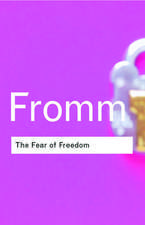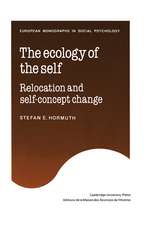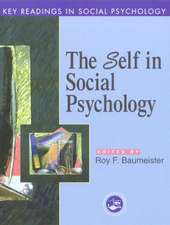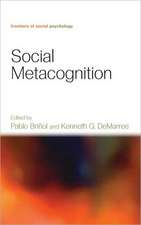Humanness and Dehumanization
Editat de Paul G. Bain, Jeroen Vaes, Jacques Philippe Leyensen Limba Engleză Hardback – 10 oct 2013
In highlighting emerging ideas and theoretical perspectives, describing current theoretical issues and controversies and ways to resolve them, and in extending research to new areas, this volume will influence research on humanness and dehumanization for many years.
| Toate formatele și edițiile | Preț | Express |
|---|---|---|
| Paperback (1) | 461.87 lei 6-8 săpt. | |
| Taylor & Francis – 7 oct 2013 | 461.87 lei 6-8 săpt. | |
| Hardback (1) | 823.57 lei 6-8 săpt. | |
| Taylor & Francis – 10 oct 2013 | 823.57 lei 6-8 săpt. |
Preț: 823.57 lei
Preț vechi: 1104.93 lei
-25% Nou
Puncte Express: 1235
Preț estimativ în valută:
157.60€ • 163.61$ • 131.42£
157.60€ • 163.61$ • 131.42£
Carte tipărită la comandă
Livrare economică 22 martie-05 aprilie
Preluare comenzi: 021 569.72.76
Specificații
ISBN-13: 9781848726109
ISBN-10: 1848726104
Pagini: 368
Ilustrații: 13 b/w images, 8 tables and 13 line drawings
Dimensiuni: 152 x 229 x 25 mm
Greutate: 0.66 kg
Ediția:New.
Editura: Taylor & Francis
Colecția Psychology Press
Locul publicării:Oxford, United Kingdom
ISBN-10: 1848726104
Pagini: 368
Ilustrații: 13 b/w images, 8 tables and 13 line drawings
Dimensiuni: 152 x 229 x 25 mm
Greutate: 0.66 kg
Ediția:New.
Editura: Taylor & Francis
Colecția Psychology Press
Locul publicării:Oxford, United Kingdom
Cuprins
Advances in Understanding Humanness and Dehumanization, P.G. Bain, J. Vaes, J.-P. Leyens. Part 1: Historical and Theoretical Insights into Dehumanization. An Anthropological History of Dehumanization from Late 18th to Mid-20th Centuries, G. Jahoda. What Is Dehumanization?, N. Haslam. The Lesser Minds Problem, A. Waytz, J. Schroeder, N. Epley. Dehumanized Perception: Psychological and Neural Mechanisms Underlying Everyday Dehumanization, V. Lee, L. Harris. (Over)Valuing "Humanness" as an Aggravator of Intergroup Prejudices and Discrimination, G. Hodson, C.C. Macinnis, K. Costello. Dehumanization: A Threat and Solution to Terror Management, N. Heflick, J. Goldenberg. Part 2: Dehumanization – Specific Targets and Fields of Occurrence. Dehumanization, Moral Disengagement and Public Attitudes to Crime and Punishment, M. Vasiljevic, G.T. Viki. Cops and Criminals: The Interplay of Mechanistic and Animalistic Dehumanization in the Criminal Justice System, R. Hetey, J. Eberhardt. Humanity Forever in Medical Dehumanization, J.-P. Leyens. The Inhuman Body: When Sexual Objectification Becomes Dehumanizing, J. Vaes, S. Loughnan, E. Puvia. An Interpersonal Perspective on Dehumanization, B. Bastian, J. Jetten, N. Haslam. Part 3: Exploring and Extending Ideas About Humanity. The Human Category: Its Structure, Its Content, and Its Implications, P.G. Bain. Dehumanization as a Denial of Human Potentials: The Naïve Theory of Humanity Perspective, M. Kofta, T. Baran, M. Tarnowska. More Human: Individuation in the 21st Century, J. Swencionis, S. Fiske. On Human-Nature Relationships, Y. Kashima, E. Margetts. Conclusion. Understanding Humanness and Dehumanization: Emerging Themes and Directions, J. Vaes, P.G. Bain, J.-P. Leyens.
Recenzii
"This timely and thought-provoking volume introduces the reader to the brave new world of systematic psychological research on our implicit theories of what it means to be human and the subtle (and not-so-subtle) ways in which we dehumanize the Other. In addition to a state-of-the-art review of theory and research in this fascinating domain, the various chapters in the volume draw links to other areas of basic and applied significance. Highly recommended." --Marilynn B. Brewer, Ph.D., University of New South Wales, Australia
"This book sheds an original, comprehensive, and wide scope of light on the concepts of humanness and dehumanization. The editors assembled very knowledgeable experts who cover numerous aspects, and in the analysis of each context they offer a coherent illumination of how these concepts are used, their meaning, and their consequences. The book is a must-have for those who want to understand how individuals and groups interact with each other and how they explain their interaction." --Daniel Bar-Tal, Ph.D., Tel Aviv University
"In this important volume, the editors have assembled leading international scholars to consider the past, present, and the future of research in this area. The volume is unusually expansive: It includes an impressive range of theoretical perspectives to understand the causes and consequences of humanization and dehumanization, defining the topic in the present and setting the scholarly agenda into the future." --John Dovidio, Ph.D., Yale University
"This book sheds an original, comprehensive, and wide scope of light on the concepts of humanness and dehumanization. The editors assembled very knowledgeable experts who cover numerous aspects, and in the analysis of each context they offer a coherent illumination of how these concepts are used, their meaning, and their consequences. The book is a must-have for those who want to understand how individuals and groups interact with each other and how they explain their interaction." --Daniel Bar-Tal, Ph.D., Tel Aviv University
"In this important volume, the editors have assembled leading international scholars to consider the past, present, and the future of research in this area. The volume is unusually expansive: It includes an impressive range of theoretical perspectives to understand the causes and consequences of humanization and dehumanization, defining the topic in the present and setting the scholarly agenda into the future." --John Dovidio, Ph.D., Yale University
Descriere
This volume presents the latest thinking and research about what it means to be human and why people dehumanize others (and sometimes themselves). Contributions provide new insights into the history of dehumanization, its different types, and new theories are proposed for when and why dehumanization occurs. The volume shows how this is important in understanding issues as diverse as ethnic conflict, medical practice, policing, gender relations, and our relationship with the natural environment. Cultural differences and similarities in beliefs about humanness are explored, along with strategies to overcome dehumanization. The volume will inform future research on the topic for years to come.






















